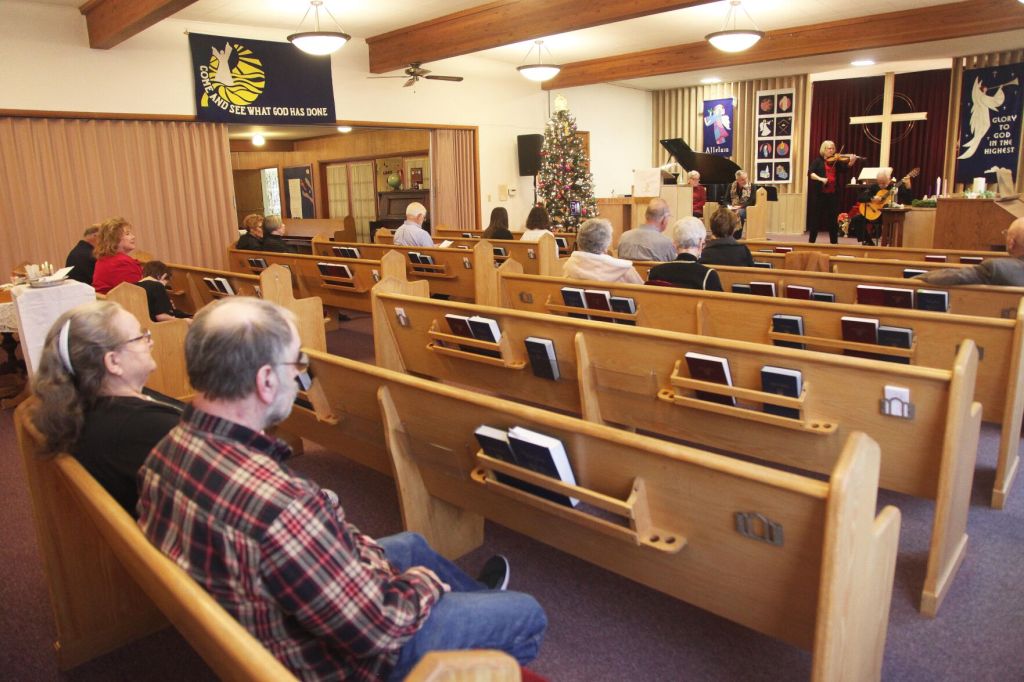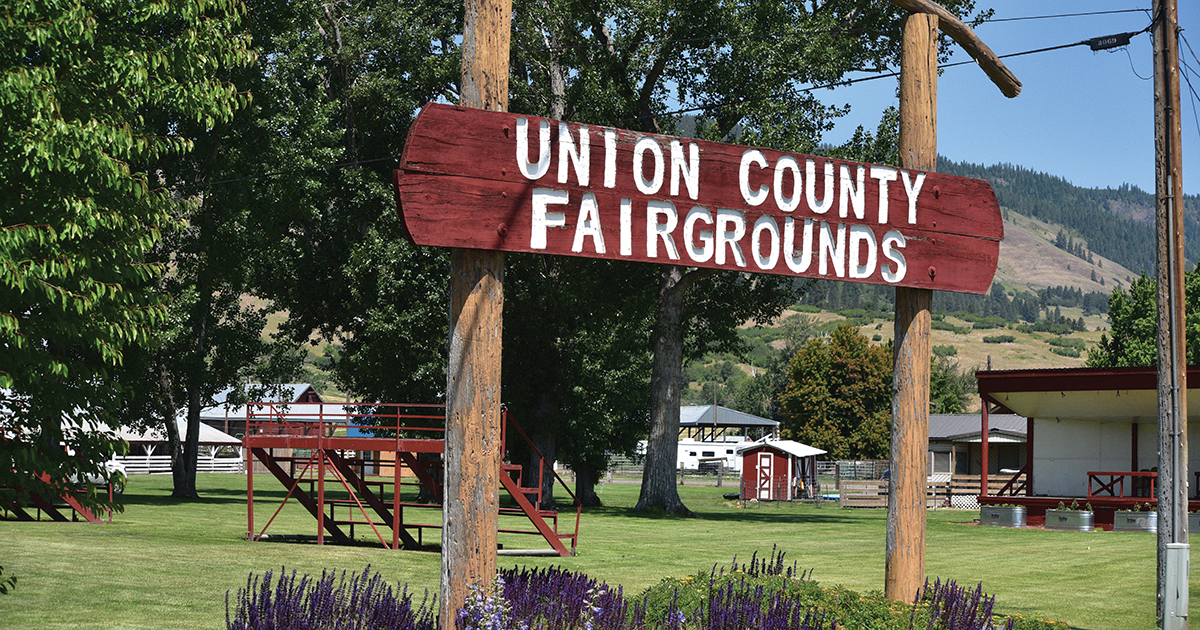Milton-Freewater church has membership dilemma
Published 11:00 am Friday, December 29, 2023

- About 16 members and guests attend the service Dec. 17, 2023, to hear the Christmas Advent message at Grace Presbyterian Church in Milton-Freewater.
MILTON-FREEWATER — The interim pastor at a Milton-Freewater church has a weighty assignment; not to grow it, but to help it fade away.
Trending
Rev. Brian Heron is working sort of a death with dignity model at Grace Presbyterian Church on Main Street in the former Milton part of town, almost across the street from the city hall.
As what is happening at many churches world-wide, not as many people are filling the pews.
“There is definitely a national trend that actually started in Europe probably 60 or 70 years ago with a shift from religious affiliation to a more secular culture, where people aren’t involved in traditional churches,” Heron said, “and so America is following that trend as well.”
Trending
Heron said the trend is easier to spot in mainline churches such as, “Congregationalist, Lutheran and Methodist, the ones that have been around in our country for like, 200 or 300 years.”
Heron said observers have measured the decline in church attendance to around 3-4% per year.
“So here at Grace Presbyterian Church, the trend is following right down the line,” Heron said. “In the mid 1960s, they had about 130 members and about 40 kids in Sunday school, a men’s group and a women’s group and a thriving choir. And that was the story in the 1950s through 1970s across the country. All these churches grew after World War II.”
Declining church attendance
“In the late 1960s, we started to see the first signs that the next generation was not returning,” Heron said. “The hope is you pass your legacy on by teaching kids in Sunday school. They will be the next generation to take on the mantle of the church.”
Grace Presbyterian Church has gone from 130 members in the mid-1960s to 19 members now, he said, with no choir, no men’s or women’s groups and a small Sunday attendance.
“And they’ve hit that place of recognizing that sort of revitalizing the congregation and getting new members after 56 years of decline, will be difficult,” Heron said. “The answer isn’t like, ‘Maybe we just work harder to get members.’ Something different is happening.”
He said the average age of the Grace congregation is probably at least 75, if not closer to 80.
“We’ve talked about the grieving process that Elisabeth Kuebler-Ross came up with, all those steps in grieving,” said church member Sherry Rowan, a 45-year member of the church and a member of the church’s Session, or governing body. “She did it with respect to the grief of loss of people, but there’s a grieving process that goes on, and in this business we’re going through right now, we’re trying to figure out where we go from here.”
That’s why the congregation hired Heron, as he has experience in leading churches that are in decline. He has become a specialist within the Presbyterian denomination.
“I think my sense in working with congregations, the anxiety has to do with the unknown, where they don’t know where they’re going to be in the future,” Heron said. “They’re concerned about closing. But churches don’t do the work that I do, there’s no need for them to be aware of all the different models out there. And I think what I’m noticing is by having somebody like me here, they can relax a little bit, because I think this is like my 15th church that I’ve done a similar process with.”
Looking at options
Heron is educated in options that attendees in failing churches might use, and he develops structures congregations can use to consider alternatives.
“We’re in the information-gathering process,” Rowan said, “where we try to look at what options are out there, what other people have done. A few weeks ago, Brian wasn’t here, so we visited another church that’s in the same boat that we are in, just a few people and thinking possibly, ‘Maybe there might be a merger somewhere down the road.’”
Heron said one of the traditions of the Presbyterian denomination is community service, and Grace Presbyterian operates a clothing bank in its unused Sunday school rooms upstairs in cooperation with Wesley United Methodist Church, just down Main Street.
Heron performs the regular duties of a pastor in addition to guiding the congregation through acceptance of a possible inevitable outcome. He does counseling and presents a sermon each Sunday. His Advent message to the congregation on Dec. 17 included a brief reference to the weighty work the congregation must do, through a process of discernment.
“I share this with your day because Grace is going through this discernment process,” Heron said from the pulpit. “If we do this work well, we’ll do all the planning and the preparation, but when it comes to the actual discernment retreats, if we’ve done the planning and getting the information and done all the thinking, then we can take some time and pause so we can see just how God might show up here at Grace Presbyterian Church in Milton-Freewater.”
‘Future is not in Sunday worship service’
Judy Sameh is another Session member at Grace Presbyterian and has attended the church for 54 years. She is well aware the younger generations are absent.
“When we were younger, we were the ones that took over when the older members got into their later 70s and 80s,” Sameh said, “and here we are, at that point with nobody to take over for us. There’s nobody to take over leadership. Our children grew up here and are not here today.”
Sameh doesn’t conclude that an absence of church attendance means a loss of commitment to faith.
“Our kids aren’t here, but they are doing things that are spiritual and doing the job of Jesus, but not here at church,” Sameh said. “I think that’s what we’re coming to realize, that our future is not in Sunday worship service. We’re not growing. This isn’t attracting people, but we’re not ready to just lock the door and say, ‘We’re done.’ You know, we don’t know what we want. We don’t know what’s ahead. But it’s obvious that what we’re doing now is not sustainable. We won’t be able to continue.”
One member of the congregation present at the Dec. 17 Advent service just came back from several years of absence, having heard of the dilemma.
“I would vote for keeping the church,” said Deborah Lee, who once was the church’s Sunday school superintendent, before life and her children’s high school and college sports got busy.
“Every weekend we were in either Nevada or Oregon State University, so we just got out of the habit,” Lee said, “and that’s absolutely deadly and we’re guilty of that. So when we heard what was going on, we decided we better put up or shut up. So we’ve started trying to come back.”









